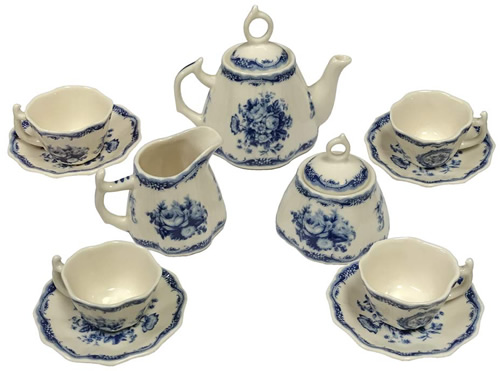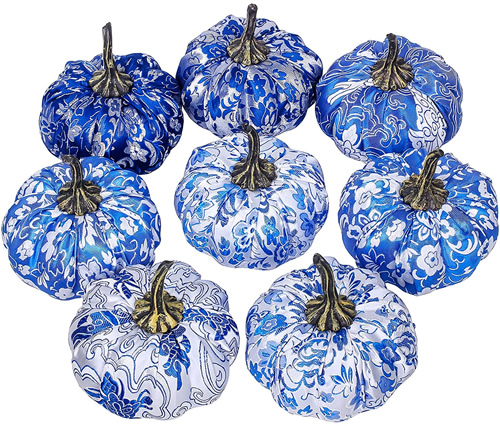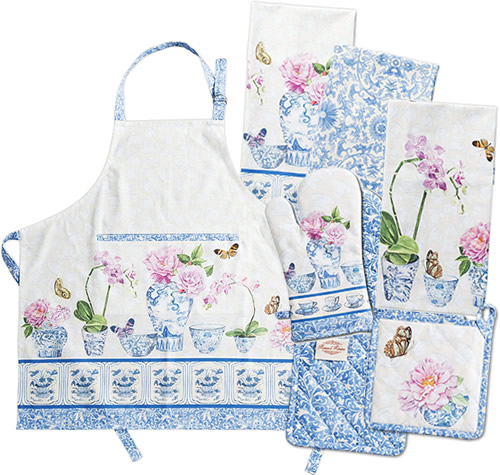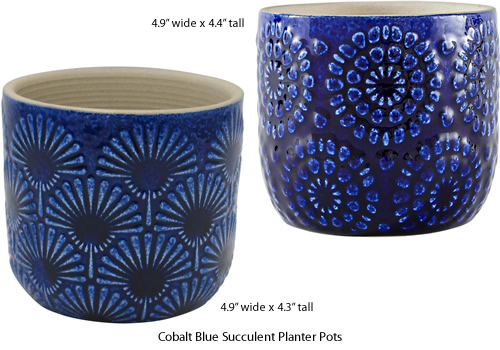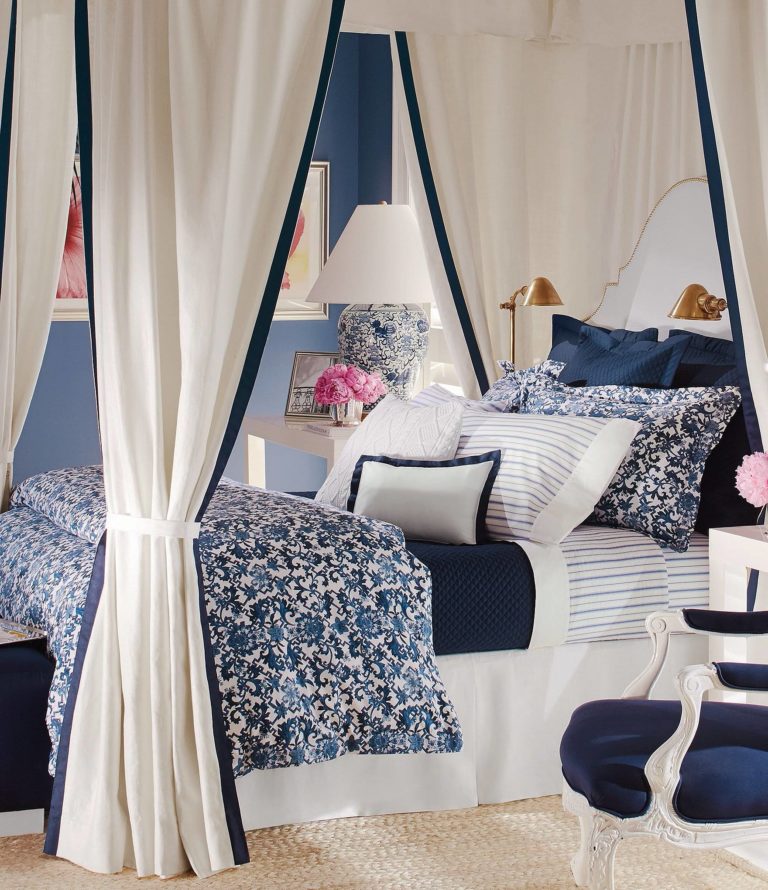Early Spring Flowers with Forcing Vases
When it is cold outside, cheer up the house with some spring bulbs. You won’t believe how easy it is to grow spring flowers in your house.
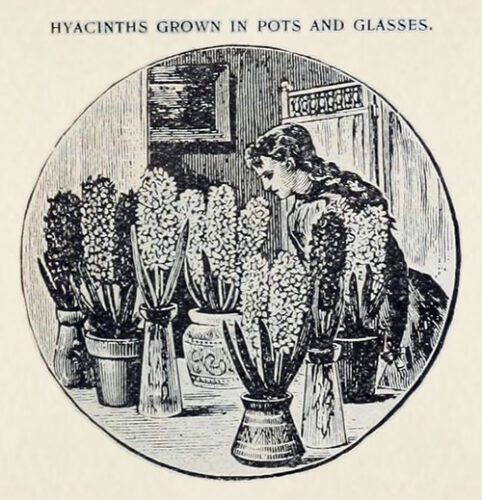
The earliest descriptions, from the early 1700s, describe how the Dutch balance a bulb on top of a bud vase. Special forcing vases are seen in illustrations by the mid 1700s.
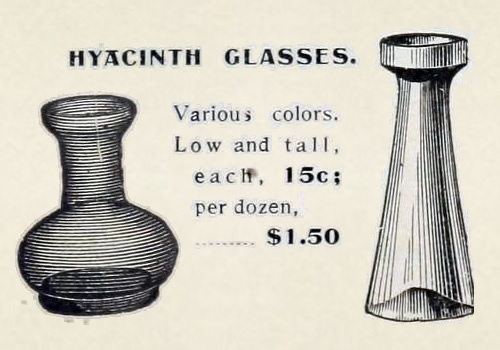
Besides having a different fork for everything, Victorians had special forcing glass vases for every kind of bulb.
Vases for Forcing Bulbs on Amazon
Tall Vases for Forcing Bulbs on Amazon
Colorful Vases for Forcing Bulbs on Amazon
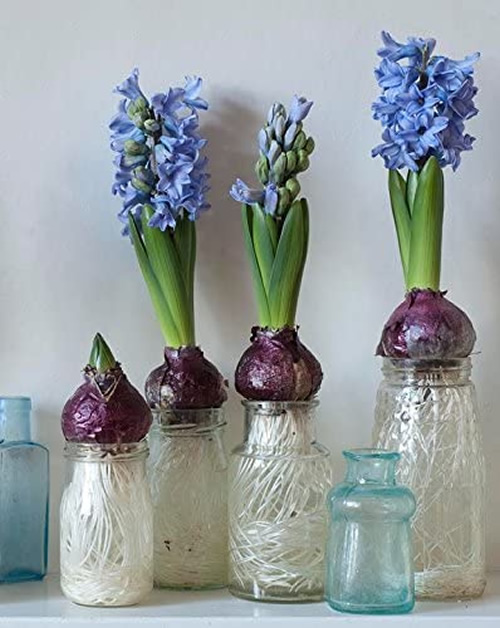
Blue Hyacinth Growing Kit from Caribbean Gardens
The concept is simple. The bulb goes in the top to stay dry. The roots reach down into the water. You don’t even have to have a special vase. Anything that holds water and balances the bulb will work. But forcing vases make it a lot easier.
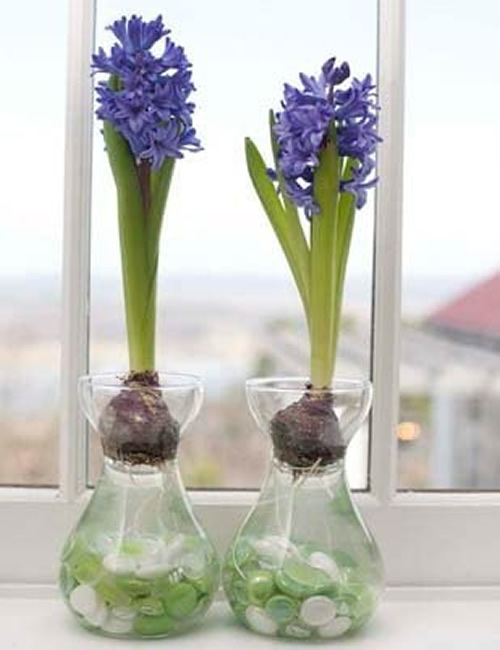
How to Force Bulbs with a Bulb Vase
Forcing bulbs just means tricking them into thinking it is spring. No actual force is involved. You’ve probably seen some of your bulbs start coming up early. I see the tops of mine any time we have a few unusually warm winter days.
Forcing bulbs uses the exact same concept.
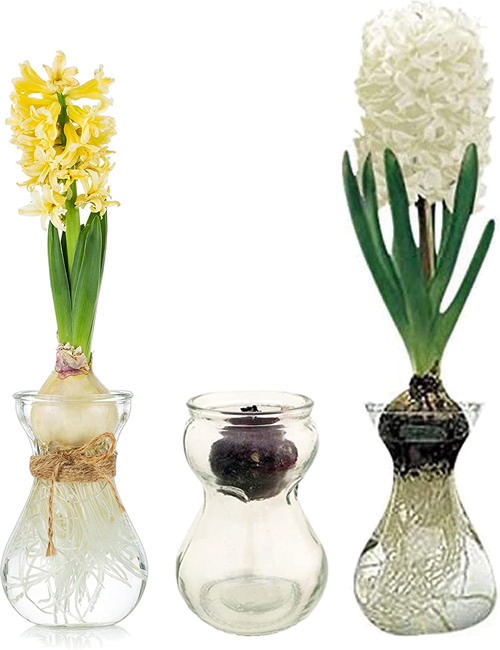
Glasseam, Caribbean Garden, and Marde Ross & Company Store
The Easiest Bulbs to Force
Amaryllis, daffodils, narcissus and hyacinths are the simplest bulbs to force. They don’t need to be chilled. Just let the bulb get some water and they will grow.
The bigger the bulb, the bigger the flower you will get. Amaryllis is really big. Grape hyacinths are really little and don’t really work with these vases.
There are other bulbs that are supposed to be easy, too, but these are the ones I have done anything with. You can find more by Googling no-chill bulbs.
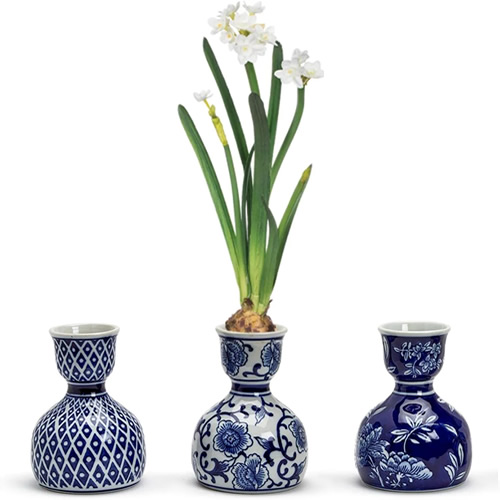
If you can’t plant them as soon as you buy them, be sure to keep them in the dark or you will have them growing in the bag, like potatoes. Store them in a bag that breathes, like paper or cloth. They are likely to rot if closed in plastic.
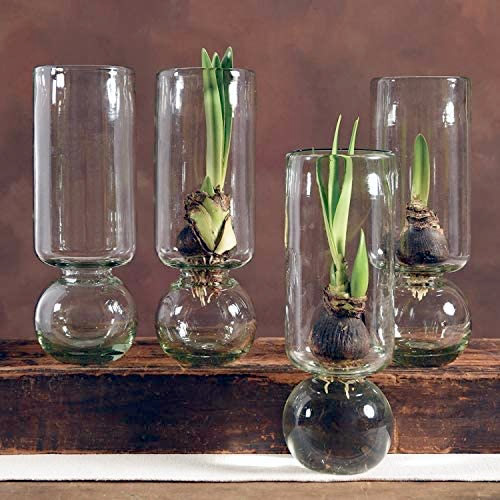
Put some water into the bulb forcing vase and put the bulb on top, pointy end up, root side down. The bulb vase makes it easy to keep the bulb dry and the roots reach down to the water.
These taller vases support the stems. I have two of these. They are ideal for daffodils. They are hands down my favorites.
Put the vase with the bulb in a dark place to mimic being underground.
I used to put mine in the cabinet under the guest bathroom sink, but I forgot they were there. If you just put a dark dish towel or something over them on the table, it works just as well.
The bulbs root fast. Within a day or two, you will start seeing roots.
Wherever you put them, don’t forget they are there. (Although I have and surprisingly the bulbs survived it and came up after I put them in the ground outside in the spring.)
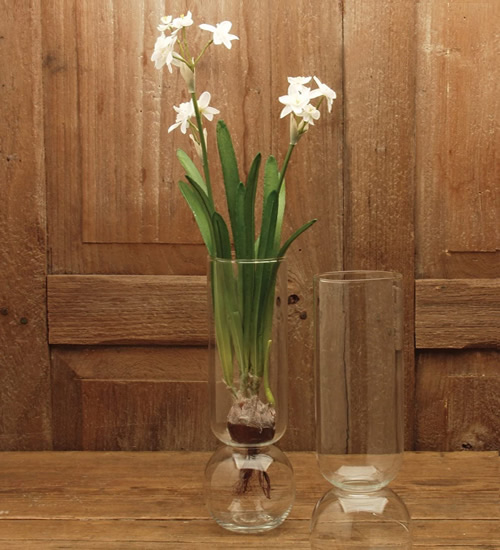
Be sure to check the water. As they grow, they can get thirsty. Just make sure the water level doesn’t get past the roots or the bulb will rot.
Once you start seeing some stem growing out of the top of the bulb, move the bulb to a window in a cool room.

Once they start to bloom, take them away from the window. The flowers will last longer if they don’t have direct sunlight or too much heat. Check the water level. Mine usually need to be topped up every two or three days.
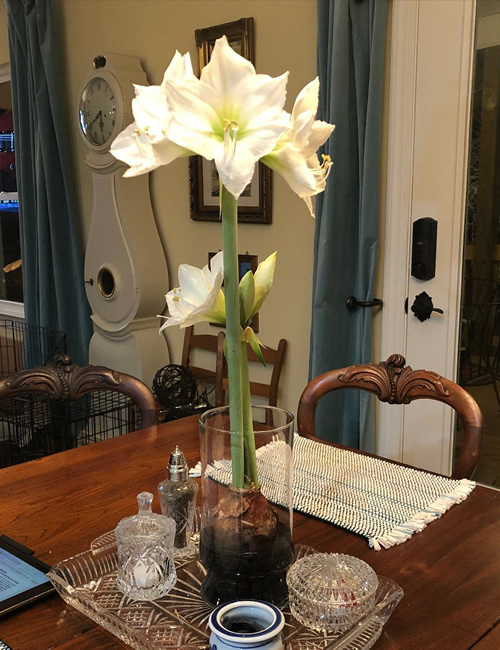
Are the bulbs dead?
They bulb is not supposed to be able to bloom again, but I have never had this be true. I always save them and put them back in the ground in the spring. I have marked the spot so I would be sure and they always come up.
When they are done blooming, I cut off the roots and the tops and put them into a paper bag in my laundry room. I put them back in the ground as soon as the weather warms up. This is way less complicated than what any of the directions say to do, but this is what I do and it works fine.
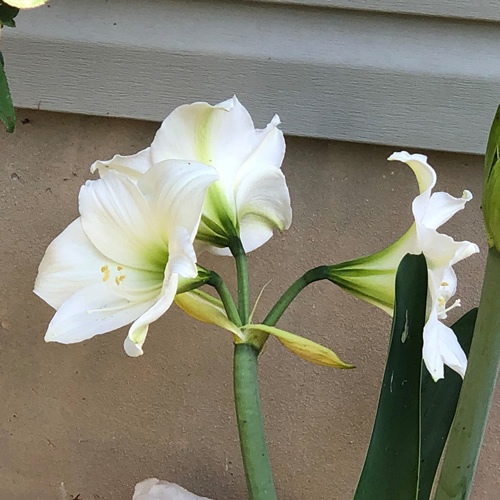
Sometimes they just make leaves for a year or two, but sometimes they even make another flower in the spring. This is the same exact bulb that bloomed on my table over the winter. I saved the bulb in a paper bag in the laundry room and put it in the ground as soon as it was warm and I remembered. It just grew leaves the year it bloomed in the house, but this is it blooming the very next year.
Bulbs that need to be chilled
Some bulbs, like tulips, need to be chilled first. That’s not difficult. Google whatever bulb you want to try to see whether it needs to be chilled and if so, how long.
Put them in a cool, not freezing spot. You can use the fridge, but take out any apples or other fruit. They naturally release ethylene gas. Did you know that you can ripen tomatoes by putting an apple in with them? Good for things you want to ripen. Not good for bulbs.
Take the bulbs out of the fridge and put them into a bulb forcer vase.
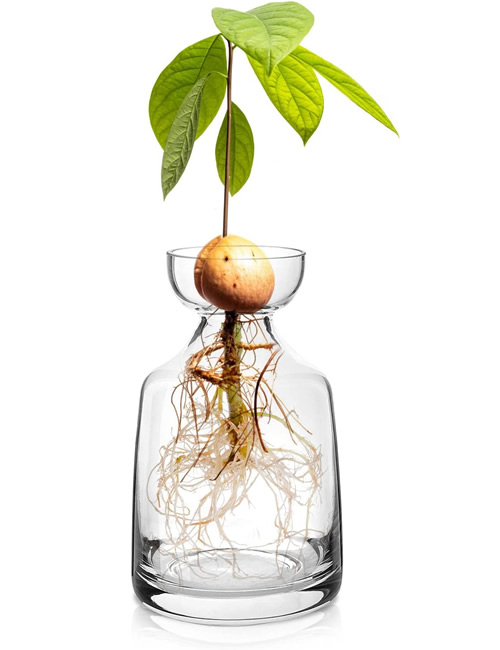
You can use forcing vases to start pits, like this avocado pit, too. It looks like this vase might hold more water, too. I might buy this.
Avocado Pit Forcing Vases on Amazon
If you are ordering bulbs, make sure you are ordering bulbs, not seeds. Some of the ads are for seeds. In theory, these flowers will grow from seeds, but not in a bulb forcer.
Paper White Narcissus
Paper White Narcissus is the most popular bulb to force. They are easy to grow, forgiving and showy. You get a lot of blooms from just one bulb. Some are fragrant, some are very fragrant.
Paper White Narcissus Bulbs on Amazon
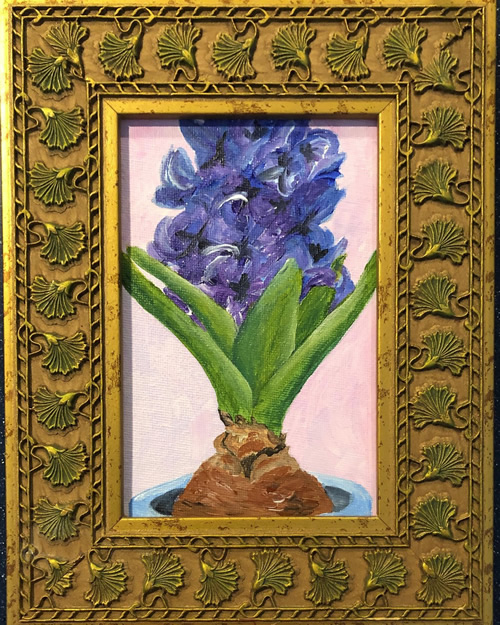
Hyacinth
Hyacinth is easy to grow in the house. The stem is not as high, so it is less likely to fall over.
I can’t find any photos of the hyacinth I forced, but I painted it.
Warning- hyacinth is VERY fragrant.
Daffodil Bulbs
I take the daffodil bulbs from the yard. If you bring them in and water them, they come right up. Then I put them back in the yard.
Amaryllis
Amaryllis is the most expensive bulb, but they are the most forgiving. And mine have come back year after year.
Discover more from my design42
Subscribe to get the latest posts sent to your email.

